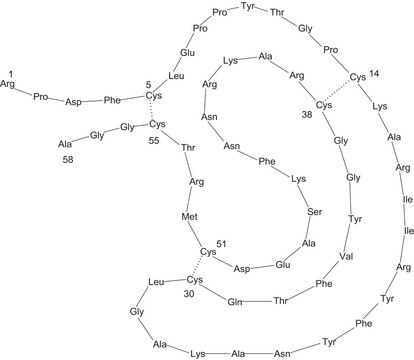A6191
Antipain dihydrochloride
lyophilized powder
Synonym(s):
N-(Nα-Carbonyl-Arg-Val-Arg-al)-Phe
About This Item
Recommended Products
product name
Antipain dihydrochloride from microbial source, protease inhibitor
biological source
Streptomyces sp.
Quality Level
form
lyophilized powder
potency
1.4 μM Ki
solubility
H2O: 50 mg/mL
1-butanol: soluble
1-propanol: soluble
DMSO: soluble
ethanol: soluble
methanol: soluble
Mode of action
enzyme | inhibits
storage temp.
−20°C
SMILES string
Cl[H].Cl[H].[H]C(=O)C(CCCNC(N)=N)NC(=O)[C@@H](NC(=O)[C@H](CCCNC(N)=N)NC(=O)NC(Cc1ccccc1)C(O)=O)C(C)C
InChI
1S/C27H44N10O6.2ClH/c1-16(2)21(23(40)34-18(15-38)10-6-12-32-25(28)29)37-22(39)19(11-7-13-33-26(30)31)35-27(43)36-20(24(41)42)14-17-8-4-3-5-9-17;;/h3-5,8-9,15-16,18-21H,6-7,10-14H2,1-2H3,(H,34,40)(H,37,39)(H,41,42)(H4,28,29,32)(H4,30,31,33)(H2,35,36,43);2*1H/t18?,19-,20?,21-;;/m0../s1
InChI key
YAHXZYICKJUJEO-BXLPLHKWSA-N
Looking for similar products? Visit Product Comparison Guide
General description
Application
papain, 0.16
trypsin, 0.26
cathepsin A, 1.19
cathepsin B, 0.59
cathepsin D, 125
plasmin, >93
chymotrypsin and pepsin, >250
It also has been reported to inhibit calpain I, (porcine) with Ki = 1.4 μM
Biochem/physiol Actions
Preparation Note
Dilute solutions should be stored on ice and kept for only a day because of the terminal aldehyde, which is subject to oxidation and racemization.
Storage Class Code
11 - Combustible Solids
WGK
WGK 3
Flash Point(F)
Not applicable
Flash Point(C)
Not applicable
Personal Protective Equipment
Certificates of Analysis (COA)
Search for Certificates of Analysis (COA) by entering the products Lot/Batch Number. Lot and Batch Numbers can be found on a product’s label following the words ‘Lot’ or ‘Batch’.
Already Own This Product?
Find documentation for the products that you have recently purchased in the Document Library.
Customers Also Viewed
Articles
Uncover properties and applications of the cysteine protease papain and find inhibitors, substrates, and other papain products.
Protocols
Thrombin is an endolytic serine protease that selectively cleaves the Arg–Gly bonds of fibrinogen to form fibrin and release fibrinopeptides A and B.
Our team of scientists has experience in all areas of research including Life Science, Material Science, Chemical Synthesis, Chromatography, Analytical and many others.
Contact Technical Service










